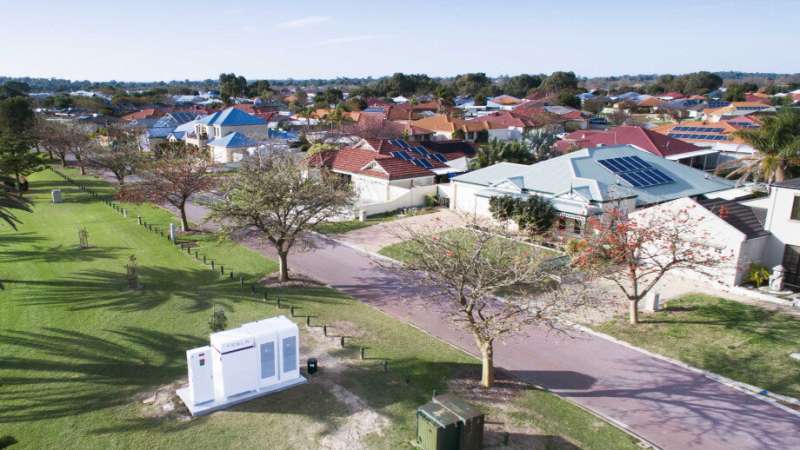
Powering ahead with community batteries

Community-scale batteries are already achievable in Australia, will complement existing household batteries and will allow more solar energy to be stored in our suburbs, analysis from The Australian National University (ANU) shows.
With the move towards community-scale batteries gathering pace across the nation, two new reports from ANU show the best way forward when it comes to their rollout.
The batteries have power capacity of around one megawatt (MW), or enough to power around 100 houses. They help “soak up” solar power generated during the day, improving reliability.
“They have the potential to play an integral role in Australia’s transition to a decentralized grid by keeping generated energy close to where it will be used,” project lead Dr. Marnie Shaw from the ANU Battery Storage and Grid Integration Program (BSGIP) said.
“A key finding of our research is that current regulations could do more to encourage local management of rooftop solar and community battery uptake.
“As such, we propose a tariff that incentivises the use of energy, close to where that energy is produced.
“This Local Use of Service tariff is essentially a price signal to customers, allowing them to benefit monetarily for storing and using energy locally.”
The reports examined social aspects that drive the uptake of community batteries—including why people are either willing or unwilling to us them.
“We weighed up potential benefits and drawbacks of community-scale batteries,” co-author Dr. Hedda Ransan-Cooper said.
“Some risks are relatively easy to overcome, like ensuring safety measures in the event of a fire, while others, such as ensuring the benefits are fairly distributed, are more complicated.”
Several community-scale battery projects are already underway across Australia.
The guidelines set out in the ANU reports will be applied in the Melbourne CBD as part of a partnership with the Yarra Energy Foundation and electricity network CitiPower. ANU will also be delivering tailored software for this trial.
“This will enable a trial of community batteries, or ‘solar sponges’ to be established in the CBD and inner-city suburbs of Melbourne,” Dr. Shaw said.
“It’s clear that complex challenges around transitioning from a centralized to a decentralized energy system can really benefit from engineers and social scientists working together.”
Is it worth investing in solar PV with batteries at home?
Implementing community-scale batteries. arena.gov.au/assets/2020/12/im … -batteries-bsgip.pdf
Implementing community-scale batteries: regulatory, technical and logistical considerations. arena.gov.au/assets/2020/12/bs … l-considerations.pdf
Citation:
Powering ahead with community batteries (2021, June 1)
retrieved 2 June 2021
from https://techxplore.com/news/2021-06-powering-batteries.html
This document is subject to copyright. Apart from any fair dealing for the purpose of private study or research, no
part may be reproduced without the written permission. The content is provided for information purposes only.
Stay connected with us on social media platform for instant update click here to join our Twitter, & Facebook
We are now on Telegram. Click here to join our channel (@TechiUpdate) and stay updated with the latest Technology headlines.
For all the latest Technology News Click Here
For the latest news and updates, follow us on Google News.

